QuestionI don't know if these are in isolation or point to a bigger problem with my GSD Brutus, whom I love so dearly. 7 y/o recently neutered male who recently is a bit lethargic, will play but tires quickly (is this his age? is he just slowing down, all ready?); nose is dry, scabby like a dermatological thing going on and SHEDDING so much I cannot believe he isn't bald yet....he's always been a shedder but this is phenomenal! No bald spots, but I don't know why not. I'm worried that these "small" things may point to a larger problem that I'm unaware of. He's a big boy--101 lbs. but the vet said not overweight. Coat, teeth, eyes, tongue are beautiful--no change. Temperament wonderful. Are we okay, or need a vet?
Thanks,
Karen
AnswerMy advice to you is to follow your gut instinct and see a vet for a check up and/or diagnosis.
German Shepherds are considered to be entering their senior stage at around 7 years old. Dogs do slow down after being neutered. All of those hormones and testosterone that kept your dog active are no longer part of his body make up.
Lethargic behavior can also be a symptom of a greater problem and is a common symptom in many ailments. Being that he is tiring quickly combined with the skin ailment and hair loss do concern me. The issue with the nose appears to be a tell tale sign that something is not right and could be a symptom of a skin disorder or disease for immune difficulty.
I am not a vet and there could be many causes for the symptoms your dog is experiencing. There would certainly be a root cause for this that would require a vet to diagnose.
All of these symptoms combined bring to mind Hypothyroidism which is common in German Shepherds.
Hypothyroidism. Insufficient thyroid hormone production caused by disease of the thyroid glands. Symptoms include hair loss, obesity, lethargy, cold intolerance and skin infections.
If your dog shows a strange change in behavior, gains weight or has skin and hair problems, it may be a good idea to have a simple test done to see if thyroid dysfunction may be a cause. The medication is inexpensive and effective but the dog must be monitored with regular blood tests to ensure the dosage is correct.
There are many useful sites on the internet with information about this problem.
The Pet Center - Information and before and after pictures http://www.thepetcenter.com/gen/hypot.html
Canis Major - Information and treatment details http://www.canismajor.com/dog/thyroid.html
Thyroid Info - More possible symptoms and diagnosis http://www.thyroid-info.com/articles/dog-hypo.htm
Hypothyroidism Fears, Facts, Thoughts & Controversies
http://www.dirt-dog.com/vet/thyroid.html
Sirius Dog - More technical article
http://siriusdog.com/articles/thyroid-thyroxin-t4-t3-dog.htm
It might also be a good idea to speak to your vet about health and nutrition for dogs his age and discuss preventative care with regard to common ailments that german shepherds experience.
Just to give you an idea of some but not all common German Shepherd Ailments they are as follows:
Information about German Shepherd Health Concerns by Age
Every dog breed carries a distinct set of genetic advantages and health risk factors. The following are the most common diseases found in the German shepherd breed.
Puppy (birth to 1 year)
* Developmental bone/joint disease
* Fear-induced aggression
Adult (1 to 6 years)
* Chronic diarrhea
* Hypothyroidism
* Pannus
* Perianal fistula
* Pyoderma
Senior (7 years and older)
* Hemangiosarcoma
* Hind limb weakness
Breed-related disease descriptions
Listed in alphabetical order
Chronic diarrhea. Loose stool that has persisted for more than two to three weeks. May be accompanied by vomiting and weight loss. Causes include ingestion of toxins, intestinal parasites, intestinal infections, digestive enzyme deficiency, food allergies, inflammatory bowel disease, hormonal abnormalities, liver or kidney disease and intestinal cancer.
Developmental bone/joint disease. Affects predominantly young, large-breed dogs. Dogs may show no signs or may show pain, lameness, and reluctance to exercise. With hip dysplasia, there may be muscle wasting in the hind legs.
Fear-induced aggression. A pet that growls and snaps when afraid thinks he is fighting for his life. Because of a combination of genetic tendencies, early experience, and sometimes abuse, the dog that cannot escape will attack. During the growling, snapping or attack, the dog shows fear postures such as crouching with his tail between his legs.
Hemangiosarcoma. Cancer of the cells lining the inside of blood vessels. Affects mainly the skin, heart, liver and spleen. Symptoms include weakness, a distended abdomen, sudden collapse and pale gums.
Hind limb weakness. Weakness and sometimes a lack of coordination or wobbliness affecting the rear limbs. Causes include slipped disc, degeneration of the bones of the spine and degeneration of the spinal cord.
Hypothyroidism. Insufficient thyroid hormone production caused by disease of the thyroid glands. Symptoms include hair loss, obesity, lethargy, cold intolerance and skin infections.
Pannus. Inflammation and discoloration of the cornea (window of the eye). Signs include pink to black growths over the front of the eye, squinting, excessive tearing or eye discharge, eye redness, rubbing or pawing at the eyes and impaired vision.
Perianal fistula. Abscesses and ulcers that form around the anus. Signs may include frequent licking around the anus, pain on defecation, straining excessively to defecate, blood in the stool and a foul-smelling discharge coming from sores around the anus.
Pyoderma. Recurring bacterial infection of the skin, often with the presence of pus. The underlying cause is thought to be an immune system deficiency. Signs include scratching, skin redness, pimples, sores, scabs and areas of hair loss. The skin may be painful and some pets may be lethargic and lose their appetites
Sincerely
Gallant German Shepherds
http://www.gallantshepherds.com

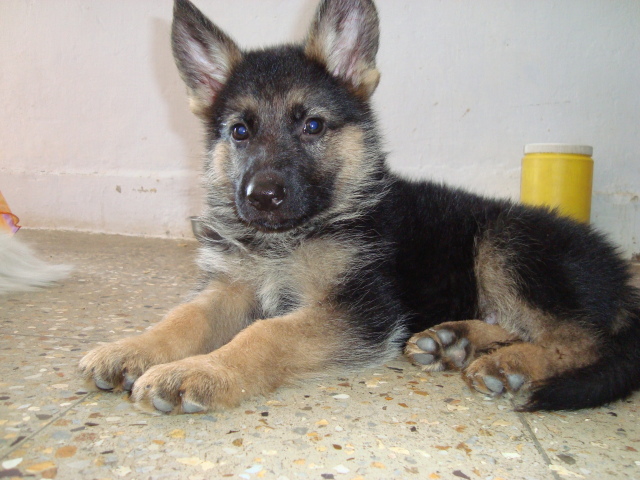 puppy weight
Question
Rocky
I recently purchase 2 mnths old GS puppy
puppy weight
Question
Rocky
I recently purchase 2 mnths old GS puppy
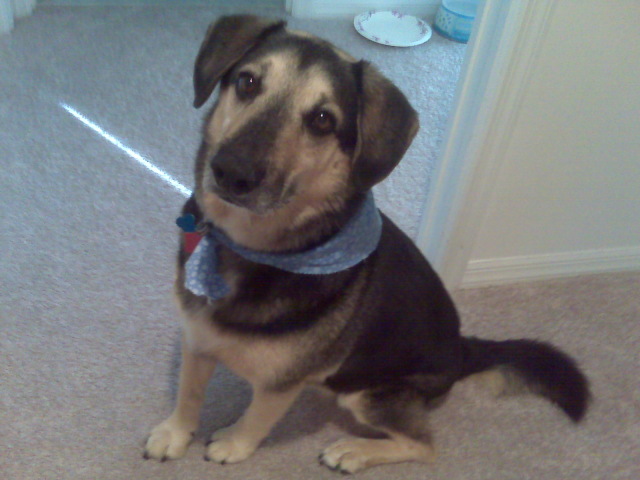 German Shepherd Mix Food
Question
Harley
Hello,
I have a 6 1/2 year old German S
German Shepherd Mix Food
Question
Harley
Hello,
I have a 6 1/2 year old German S
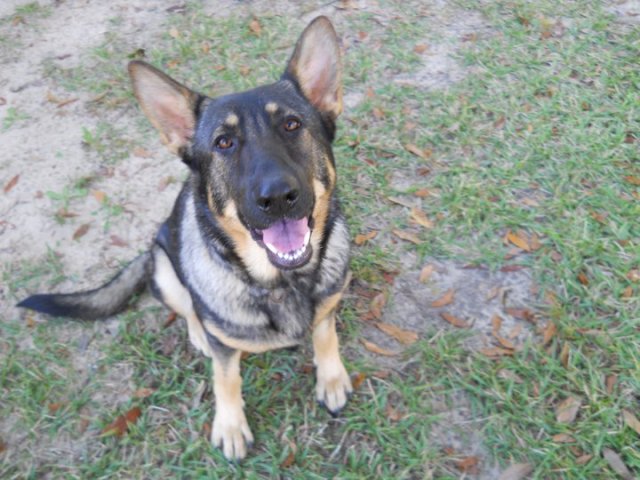 Training rescued German Shepherd
Question
Libby
My boyfriend and I have recently took in
Training rescued German Shepherd
Question
Libby
My boyfriend and I have recently took in
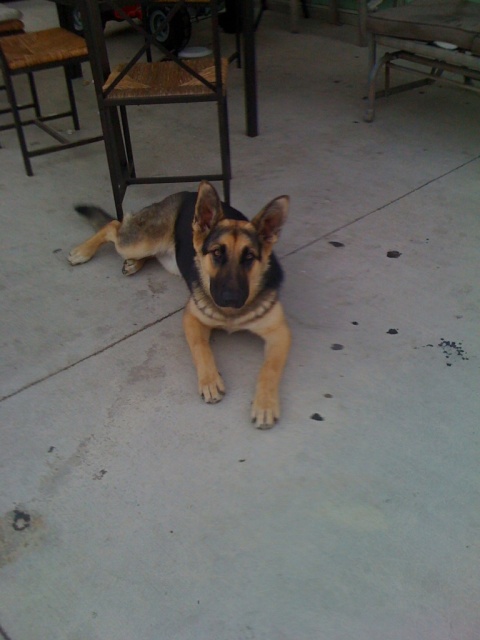 6 month pup
Question6 month old female
QUESTION: I was offer
6 month pup
Question6 month old female
QUESTION: I was offer
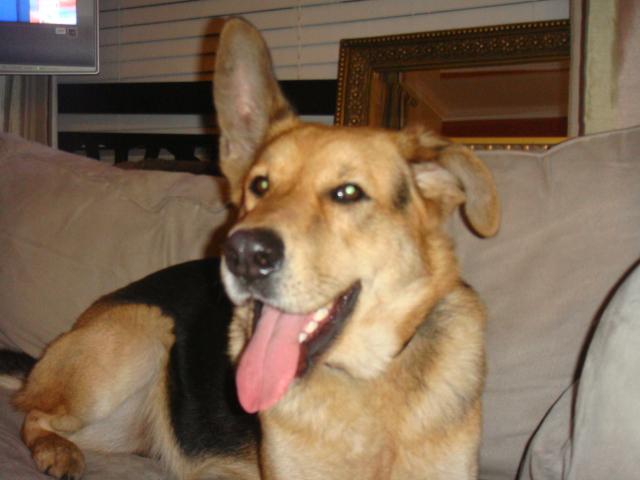 Shepherd ears/teeth
Question
Rosco
We have just taken in a shepherd that we
Shepherd ears/teeth
Question
Rosco
We have just taken in a shepherd that we